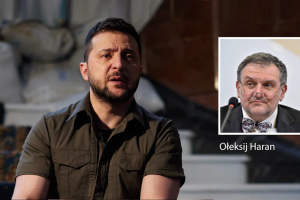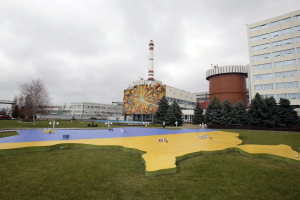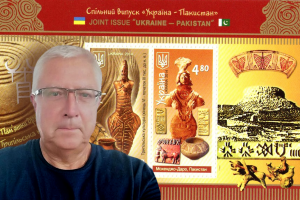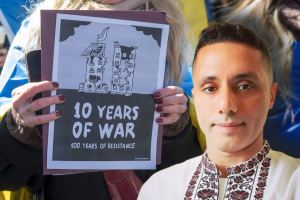Source: Daily Maverick
By Peter Fabricius
‘To them, we are not Ukrainians. We are little Russians.’ This is how a visiting Ukrainian scholar describes the deep, historic roots of the war in Europe.
Before Russian President Vladimir Putin began destroying Ukraine, he first tried to destroy Ukraineness, the sense of national identity of the Ukrainian people.
To Ukrainian scholar Olexiy Haran, it is no surprise that Russians are committing atrocities in Ukraine, including abducting Ukrainian children and deporting them to Russia, a war crime for which the International Criminal Court (ICC) has issued a warrant of arrest for Putin.
The ICC, Ukraine’s 2022 Nobel Peace Prize-winning Center for Civil Liberties and others are investigating the many atrocities committed by Russian troops against Ukrainians since they invaded the country on 24 February 2022, including the cold-blooded execution of many civilians. To Haran, these crimes, horrible as they are, flow logically from Putin’s and Russia’s denial of the existence of Ukrainians as such, for centuries.
“To them, we are not Ukrainians. We are little Russians,” he told Daily Maverick on a visit to South Africa earlier this year. Haran, a professor of comparative politics at the National University of Kyiv-Mohyla Academy and research director at the Democratic Initiatives Foundation, a leading Ukrainian analytical and sociological think tank, was back in South Africa this month, speaking about the war at the Swedish embassy in Pretoria, along with Charlotta Rodhe, the deputy director of the Stockholm Centre for Eastern European Studies.
There and in an earlier interview with Daily Maverick, Haran focused on the deep, historic roots of the war.
From Moscow’s perspective, to even claim Ukrainian identity is treasonous, he said.
‘Agent of the West’
“You don’t exist as Ukrainian. If you say you are Ukrainian, you speak the Ukrainian language, you are the agent of the West because you are constructed by the West.”
This denial of the very identity of Ukraine and Ukrainians had created “the preconditions for genocide”, he said.
“Because what are the reasons for the war? It’s not about the West versus Russia [as Putin insists]. It’s not about expanding Nato. No, that’s all bluff.”
When Russia first attacked Ukraine, in 2014, Ukraine had “official non-bloc status”, meaning its official policy was not to join either Nato or the Russian camp, but to remain “non-aligned”, in South Africa’s language.
This official stance was solidly based on public opinion in Ukraine, Haran noted. Polls showed that until 2014 most Ukrainians felt positive about Ukraine joining the Russia-Belarus union, which was mostly economic. In 2012, only 12% of Ukrainians thought their country should join Nato, while most believed their country should not join any military bloc.
These sentiments dramatically reversed in 2014 after Russia invaded and annexed Crimea. Support for joining Nato immediately jumped to 33% and by 2017 had reached 47%, before rising well above 50% after Russia’s second invasion last year.
“Putin didn’t just increase the desire to join Nato. He created it,” Haran stated.
However, even back then, Ukrainians wanted to join the European Union and also a free trade zone with Russia. Belonging to both was not possible geopolitically, but Ukrainians were naïve enough to believe it could and should be done, he said.
Haran noted that in 2014 Russia attacked a country that was not only “non-bloc” but which had also given up its nuclear arsenal of several hundred weapons in 1994, after the collapse of the Soviet Union. Ukraine handed over its nuclear weapons to Russia in exchange for guarantees of its territorial integrity from the US, the UK — and Russia, he added, with a bitter laugh.
Rebuilding the Russian Empire
Russia’s invasion of Ukraine could not have been motivated by fear of Nato expanding into Ukraine, as Moscow has insisted, “because we didn’t want to join Nato. So what was the reason?
“The reason is that Putin wants to rebuild the Russian Empire. And within the Russian Empire, we Ukrainians were not considered a separate nation. We were considered as ‘Little Russia’. This was the exact official term in the Russian Empire. Ukraine was called Little Russia so Ukrainians were called Little Russians.
“And our language was banned from public use.”
Yet, he said, pulling out an early map, in the year 1000 the Kyiv Principality (also called Kyivan Rus or Kievan Rus depending on your point of view) was the largest state in Europe, while Moscow was “founded only in 1147 as a very small town”. (Orlando Figes, in his book The Story of Russia, says that both Ukraine and Russia claim descent from the first prince of Kievan Rus. The Russians call him Vladimir and the Ukrainians Volodymyr, ironically.)
“So, Kyiv is at least 600 years older than Moscow,” Haran continues. “Ukrainian history and culture are very rich and they started long before Russia.”
But then Moscow emerged and grew more powerful and Kyiv was eventually incorporated into the Russian Empire. “So that’s how we started to live with the Russian empire, where Russians denied our existence.”
His own university, the Kyiv-Mohyla Academy, founded in 1615, was shut down in 1815 by Russian Tsar Alexander 1 “because it was the centre of Ukrainian culture”.
Dzvinka Kachur of the Ukrainian Association in South Africa pointed out that before closing the university, Russia banned its professors from teaching in the Ukrainian language and sent Russian professors to teach there. They also burned all books printed in Ukrainian.
The Soviets maintained the Russian Empire’s ban on Haran’s university, so it only re-emerged in 1991 after the Soviet Union collapsed. But Putin’s ideology has been to revert to the Russian imperial practice of dismissing the Ukrainians as “Little Russians … who are part of the great Russian people”, says Haran.
“It’s stated by Putin [and Russian state agencies] many times. So he continues to say Ukraine never existed as a separate state, that Ukrainians are one state with Russia. So we’re not separate, we’re just part of Russia.”
‘Re-educated, deported, crushed, killed’
Russia’s stated aim is to “de-Ukrainise Ukraine … so this was the whole ideological justification of genocide with clear mentions of what should be done with Ukrainians. Ukrainians should be re-educated, deported, crushed, killed and the whole of Ukraine should be divided into quasi-states without the name Ukraine in the title. Can you believe it?
“This is the ideological background for the war crimes which are being committed in Ukraine right now,” including the abduction and deportation of Ukrainian children, clearly a form of ethnic cleansing.
“If you say you are Ukrainian, you speak the Ukrainian language, you are the agent of the West because you are constructed by the West.
“And the Putin government’s intent of destroying not only Ukraine but also ‘Ukraineness’ includes destroying Ukrainian churches, Ukrainian monuments … Ukrainian national figures, the poets … banning Ukrainian books from the libraries.
“You may say; ‘Oh some bad Russian soldiers are doing it.’ But if you are taught that we are all Nazis, that we don’t exist…”
Haran believes that by attacking Ukraine in 2014 and then again in 2022, Putin not only created Ukraine’s desire to join Nato, but also cemented the Ukrainian identity.
He dismisses the common international view that Ukraine is a nation split down the middle between a pro-European west and a pro-Russian east.
“We are not ethno-nationalists,” he says. “You can be ethnic Russian. You can be ethnic Ukrainian who is speaking the Russian language. You can be Jewish. You can be Muslim. It doesn’t matter. If you consider Ukraine as your motherland, you are part of the Ukrainian political nation.
“That’s very important to understand. It’s a war of Russia against Ukraine. But it’s not correct to say it’s a conflict between Ukrainians and Russians. Because Russians are living in Ukraine. They know the Ukrainian language. We are bilingual almost by default. We don’t know who you are. We are speaking together, the one is speaking Ukrainian, the other is speaking Russian, which is a very common practice in Ukraine. We are not asking, ‘Who are you? Are you Ukrainian, are you Russian?’ No one does that.”
He adds that Putin destroyed such pro-Russia sentiment as there might have been, by attacking and destroying — even as he claimed to be liberating — cities like Kharkiv, Ukraine’s second-biggest city, and Mariupol, which had been mostly Russian-speaking.
‘You are free to speak Russian’
Haran says Russian Foreign Minister Sergey Lavrov claims that if you speak Russian in Kyiv you will be beaten. This is nonsense, he says. His own first language is Russian and he still speaks it with his mother, who is now learning to speak Ukrainian better, to increase her knowledge of the country’s history and culture.
“If you are Russian-speaking, we are not going to tell you, “Stop talking Russian.’ You need to know the Ukrainian language. But otherwise, you are free to speak Russian.”
It’s a simplification to say that the Donbas region, comprising the two eastern provinces of Donetsk and Luhansk now partly occupied by Russian troops, is pro-Russian, Haran says. Before the February 2022 invasion, Russia had occupied only about one-third of Donbas, so it was impossible for Ukraine to conduct polls there.
But in the rest of Donbas, polls showed that a majority of people regarded themselves as Ukrainians whatever language they spoke. Kachur adds that about 1.5 million Ukrainians fled eastern Ukraine after the 2014 invasion so it would be very difficult to get a sense now of what the overall population thinks.
Haran also notes that most of the Russian-speakers in Donbas cities had grandparents living in the villages who spoke Ukrainian. But the younger residents who moved to the cities were “Russified” under the Soviet Union.
“The Soviet Union was talking about the brotherhood of nations. In reality, it was a colonial empire, with Russification. I couldn’t speak the Ukrainian language in the Soviet Union era. So this was an assimilation policy.
“One of the basic mistakes of Putin was that he thought that if you have people who are mostly speaking the Russian language in the south and east of Ukraine, they would greet Russian soldiers with flowers. And instead, they greeted Russian soldiers with guns.”








